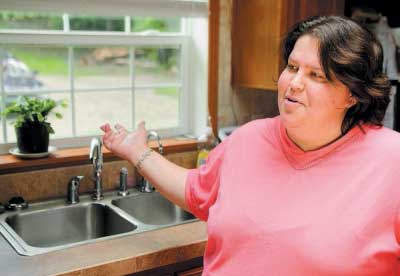An estimated 150,000 people statewide are drinking water from wells that have harmful levels of arsenic, a carcinogen that occurs naturally in the bedrock that is prevalent in Maine, and has been linked to a number of health problems, including poor brain development.
For those who are aware enough of the problem to have their wells tested, and can afford the cost of treatment systems, clean water is a couple of phone calls away. But for the many Mainers who don’t think to have a test done, or who cannot afford remediation on problem wells, drinking water is a health hazard.
Two bills before the Legislature this session aim to fix that, by promoting awareness of Maine’s arsenic problem, and by establishing a fund to help low-income Mainers purchase treatment systems. However, the first bill, L.D. 1162, sponsored by Rep. Drew Gattine, D-Westbrook, was criticized this week for how it chooses to finance the fund: namely, through fees on well testing and the installation of treatment systems.
The criticism, from treatment and testing business owners who say the fees will cut into their already slim profit margins, likely will compel lawmakers to find another funding source.
And find another source they should, because no one should be forced to put their health at risk every time they turn on their tap.
The extent of those health risks has become clear in recent years. In Kennebec County – which, along with parts of York County and Down East Maine, is the epicenter of the arsenic problem – 29 percent of the wells tested by the state between 2005 and 2009 had higher concentrations of arsenic than the federal standard for public drinking water. In many tested wells, the level of arsenic is 40 or 50 times what is considered safe, even in cases of limited exposure.
What’s more, a study released early last year, involving Augusta-area and York County schoolchildren, found that even at levels below the federal standard, arsenic in drinking water could lower IQ levels by 5 or 6 points.
Unfortunately, only about 42 percent of well owners recall having their wells tested.
Yes, many homeowners are unaware that arsenic is a potential issue, making outreach and education an important part of both L.D. 1162 and L.D. 937, a similar bill from Sen. Tom Saviello, R-Wilton.
But others simply cannot afford treatment systems that remove arsenic, which can run from hundreds of dollars to thousands of dollars. Even if their test came back with bad results, they couldn’t do anything about it.
That leaves thousands of poor Mainers to drink tap water laced with poison, and threatens to put yet another hardship in the way of students from low-income families, who already face more than their share of obstacles.
Lawmakers need to find a way to get treatment systems to those Mainers. Access to clean, safe drinking water should not be a luxury.
Send questions/comments to the editors.



Success. Please wait for the page to reload. If the page does not reload within 5 seconds, please refresh the page.
Enter your email and password to access comments.
Hi, to comment on stories you must . This profile is in addition to your subscription and website login.
Already have a commenting profile? .
Invalid username/password.
Please check your email to confirm and complete your registration.
Only subscribers are eligible to post comments. Please subscribe or login first for digital access. Here’s why.
Use the form below to reset your password. When you've submitted your account email, we will send an email with a reset code.